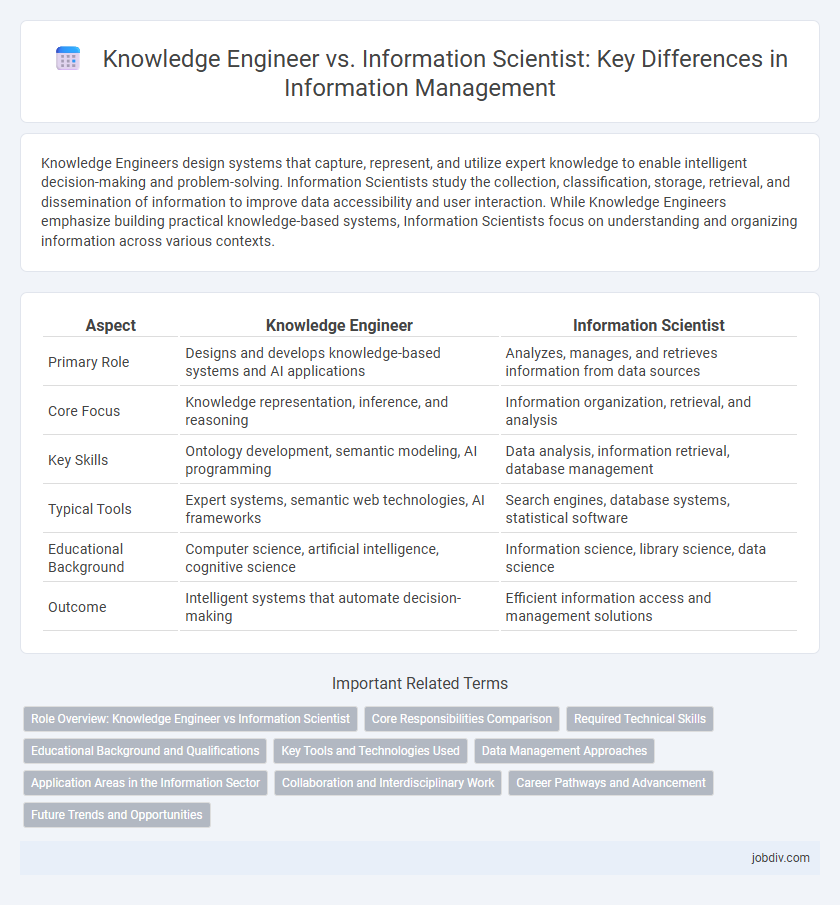Knowledge Engineers design systems that capture, represent, and utilize expert knowledge to enable intelligent decision-making and problem-solving. Information Scientists study the collection, classification, storage, retrieval, and dissemination of information to improve data accessibility and user interaction. While Knowledge Engineers emphasize building practical knowledge-based systems, Information Scientists focus on understanding and organizing information across various contexts.
Table of Comparison
| Aspect | Knowledge Engineer | Information Scientist |
|---|---|---|
| Primary Role | Designs and develops knowledge-based systems and AI applications | Analyzes, manages, and retrieves information from data sources |
| Core Focus | Knowledge representation, inference, and reasoning | Information organization, retrieval, and analysis |
| Key Skills | Ontology development, semantic modeling, AI programming | Data analysis, information retrieval, database management |
| Typical Tools | Expert systems, semantic web technologies, AI frameworks | Search engines, database systems, statistical software |
| Educational Background | Computer science, artificial intelligence, cognitive science | Information science, library science, data science |
| Outcome | Intelligent systems that automate decision-making | Efficient information access and management solutions |
Role Overview: Knowledge Engineer vs Information Scientist
Knowledge Engineers specialize in designing and implementing knowledge-based systems, focusing on structuring, encoding, and maintaining organizational knowledge to improve decision-making processes. Information Scientists analyze, manage, and apply data and information resources to optimize information retrieval, organization, and usability across various platforms. While Knowledge Engineers emphasize system development for knowledge representation, Information Scientists prioritize the effective management and accessibility of information.
Core Responsibilities Comparison
Knowledge engineers specialize in designing and implementing knowledge-based systems that capture, structure, and utilize organizational expertise to support decision-making processes. Information scientists focus on managing, organizing, and retrieving information through data analysis, information architecture, and user-centered design to enhance accessibility and usability. Core responsibilities of knowledge engineers include knowledge modeling and system integration, whereas information scientists prioritize information management, retrieval systems, and user interaction optimization.
Required Technical Skills
Knowledge Engineers require strong skills in knowledge representation, ontology creation, and rule-based systems, enabling them to design and implement intelligent systems. Information Scientists focus on data management, information retrieval, and statistical analysis, often using programming languages such as Python or R for data processing. Both roles demand proficiency in database technologies and familiarity with machine learning techniques to optimize data utilization and decision-making processes.
Educational Background and Qualifications
Knowledge Engineers typically hold degrees in computer science, information technology, or knowledge management, with strong expertise in artificial intelligence, ontology, and data modeling. Information Scientists often possess educational backgrounds in library science, information science, or data analytics, emphasizing research methodologies, data organization, and information retrieval systems. Both roles require advanced qualifications, but Knowledge Engineers lean towards technical skills and programming, while Information Scientists focus on information theory and data analysis principles.
Key Tools and Technologies Used
Knowledge engineers utilize tools such as ontology editors like Protege, knowledge representation languages including OWL and RDF, and reasoning engines to structure and infer knowledge from complex data systems. Information scientists emphasize data analysis software, database management systems like SQL and NoSQL, and visualization platforms including Tableau and Power BI to extract and communicate insights from large information sets. Both professionals employ AI and machine learning frameworks, but knowledge engineers focus more on semantic technologies, whereas information scientists prioritize statistical and computational analysis tools.
Data Management Approaches
Knowledge Engineers design structured frameworks and ontologies to capture, organize, and automate knowledge representation, enabling efficient reasoning and inference. Information Scientists prioritize the collection, classification, and retrieval of large datasets, emphasizing metadata standards and information lifecycle management to optimize accessibility. Both roles employ data management approaches that ensure accuracy, consistency, and usability, but Knowledge Engineers focus more on semantic modeling while Information Scientists concentrate on data curation and user-centered information systems.
Application Areas in the Information Sector
Knowledge Engineers specialize in designing and implementing knowledge-based systems, focusing on artificial intelligence, expert systems, and semantic web technologies to optimize decision-making processes. Information Scientists analyze, organize, and manage data using information retrieval, data mining, and digital libraries to improve access and usability of information resources. Both professionals contribute to sectors like healthcare, finance, and education by enhancing data-driven strategies and knowledge management frameworks.
Collaboration and Interdisciplinary Work
Knowledge engineers and information scientists excel at collaboration through integrating expertise from computer science, cognitive psychology, and domain-specific fields. Their interdisciplinary work facilitates the design of intelligent systems that enhance data management, knowledge representation, and decision-making processes. Joint efforts enable the development of innovative solutions by combining knowledge engineering's focus on ontologies and rule-based systems with information science's emphasis on information retrieval and organization.
Career Pathways and Advancement
Knowledge Engineers design and maintain systems that organize and apply knowledge, focusing on artificial intelligence, semantic technologies, and expert systems development, which opens career pathways in AI development, data architecture, and systems consulting. Information Scientists analyze and manage information flow, specializing in data curation, information retrieval, and user experience that leads to roles in data analytics, information management, and digital library sciences. Career advancement for Knowledge Engineers often requires expertise in computer science and AI, while Information Scientists benefit from strong skills in data analysis, information architecture, and user behavior research.
Future Trends and Opportunities
Knowledge engineers will increasingly leverage artificial intelligence and machine learning to design intelligent systems that improve data processing and decision-making efficiency. Information scientists are poised to advance big data analytics and information retrieval technologies, enabling more precise knowledge discovery and management. Emerging trends include the integration of semantic web technologies and advanced data visualization tools, creating new career opportunities in AI-driven information ecosystems.
Knowledge Engineer vs Information Scientist Infographic

 jobdiv.com
jobdiv.com